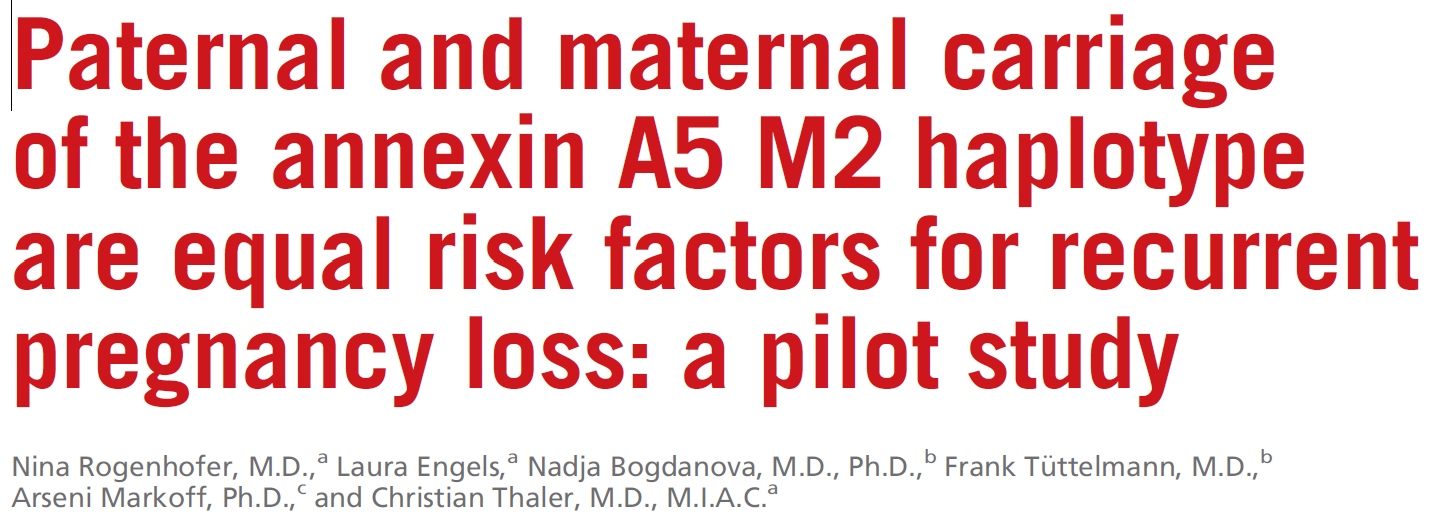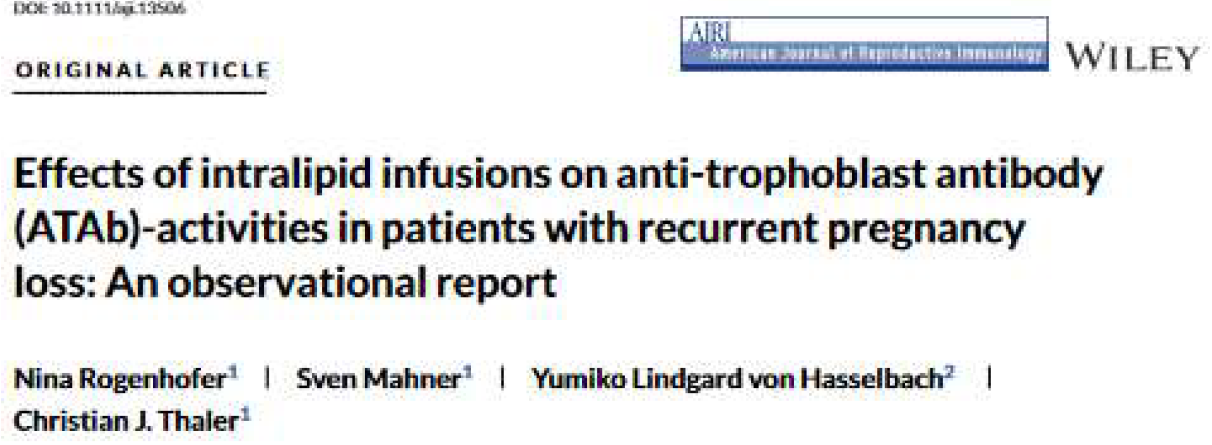Miscarriage
A miscarriage is a deeply traumatic experience that raises many questions and causes emotional distress. Many couples wonder about the causes and whether repeated miscarriages can be prevented. The frequency of sporadic miscarriages depends on age and increases with advancing age. These are usually caused by chromosomal distribution disorders in the egg cell, which become more common with increasing maternal age. In contrast, recurrent miscarriages are usually caused by other factors that are largely independent of maternal age. Distinguishing between sporadic and systematic (recurrent) miscarriages is very important when planning another pregnancy, as this is a prerequisite for a meaningful search for the cause. Only then is it possible to develop a targeted strategy to prevent further miscarriages.
Topics on This Page
- Why Miscarriages Happen
- Diagnosis After Miscarriage
- What You Will Find Here
- Sporadic Miscarriages
- Single or Recurrent (Habitual) Miscarriages
- Systematic Recurrent Causes
- M2 Haplotype of the Annexin A5 Gene (M2/ANXA5)
- Anti-Trophoblast Antibodies
- Further Possible Causes – Sense and Nonsense of Treatment Options
- FAQ
Why Miscarriages Happen
A miscarriage is a deeply traumatic experience associated with many questions and emotional burdens. Many couples wonder about the causes and whether recurrent miscarriages are preventable. The frequency of miscarriages is age-dependent and increases with advancing age. It is therefore all the more important to know the possible causes and to treat them in a targeted manner where appropriate.
In young women, about one in seven pregnancies ends in miscarriage; in women over 40, it is already one in three. The most common cause is sporadic chromosomal abnormalities in the egg cell. In cases of recurrent miscarriages (habitual abortions), however, systematic causes such as coagulation disorders, immunological factors, or anatomical peculiarities should be ruled out.
If you have any queries on why you experienced one or even several consecutive miscarriages, or on any results of your medical work up, I am happy to offer a personal and independent online-consultation.
Diagnosis After Miscarriage
After one or more miscarriages, targeted diagnostics is advisable. This includes genetic counseling, testing for coagulation disorders (e.g., M2 haplotype of the Annexin A5 gene), immunological factors (anti-trophoblast antibodies), anatomical peculiarities of the uterus, and hormonal imbalances. Comprehensive investigation helps reduce the risk of future miscarriages.
In cases of several recurrent miscarriages, systematic investigation is particularly important. Coagulation factors, antiphospholipid antibodies, chromosomal analyses of both partners, uterine factors, and endocrine disorders are examined. Based on the findings, individualized treatment options such as anticoagulation, hormone substitution, or surgical corrections can be offered. If you woud like additional advice or a a second opinion on the results of your medival work up or on diagnostic options, I am happy to offer a thorough, personal online-consultation.
What You Will Find Here
In cases of recurrent miscarriages, therapeutic support is crucial alongside diagnostics. Depending on the cause, various treatment approaches can be considered: In cases of coagulation disorders or immunological factors, medication therapy (e.g., with heparin, aspirin, or immunoglobulins) can reduce the risk of further miscarriages. In cases of anatomical changes in the uterus, surgical corrections may be helpful.
In addition to medical treatment, psychological support after miscarriages is essential. The emotional burden for couples is often immense – feelings of grief, guilt, or failure are completely normal. Psychosocial support can help process the loss and develop new perspectives. In a personal consultation, we discuss all medical and emotional aspects in detail.
On this page, you will find comprehensive information on various aspects of miscarriages:

Sporadic Miscarriages
A miscarriage – the death or abnormal development of a pregnancy or the loss of a potentially viable pregnancy – represents the most common serious complication of pregnancy. In young women, nearly one in seven pregnancies ends in miscarriage, and this frequency increases further with a woman’s age: in women over 40, a miscarriage must be expected in almost every third pregnancy. By far the most common cause of miscarriages is a sporadic chromosomal disorder of the underlying egg cell, whereby the woman’s body usually recognizes this disorder at an early stage of pregnancy development and then terminates the further course early. In principle, a chromosomal abnormality can be detected in the pregnancy tissue by means of a genetic examination. The most common result of such an examination – the detection of a sporadic chromosomal disorder – usually means that the risk of miscarriage for subsequent pregnancies is not significantly increased – i.e., corresponds to the comparative age risk.

Single or Recurrent (Habitual) Miscarriages

Single or Recurrent (Habitual) Miscarriages
You become pregnant, but you cannot carry the baby? The fruit has died (missed abortion)? Or there was bleeding and the pregnancy was lost? Before the miscarriage, could an embryo be seen on ultrasound? Was there a heartbeat visible? Have you perhaps already suffered several miscarriages? Is the course similar each time or did the pregnancies differ? Could the tissue be examined microscopically and/or genetically? Are there already further investigations into possible causes of the miscarriages? Are there therapy suggestions for another pregnancy?
For many years, I have been intensively involved with the diverse causes of single and recurrent (habitual) miscarriages. I have advised and cared for many couples with miscarriages and I know the suffering and uncertainty that often spreads in the lives of affected couples. What is essential to clarify first is: is it one or more sporadic miscarriages, because these cases are extremely stressful, but there is no concrete risk of recurrence. Here it is essentially about “support” and “stress reduction” and medical, possibly side-effect-laden treatment is not necessary and may even carry unnecessary risks (and/or costs)! Or is there a fundamental medical problem? In this case, one must possibly reckon with a high risk of recurrence for further miscarriages. Without goal-oriented diagnostics and knowledge of the causes, further pregnancies often have only low chances of a normal birth and only increase the suffering even more! Here it is of great importance to know the therapeutic possibilities and to use them in a targeted manner.
Systematic Recurrence Causes
Systematic Recurrent Causes
The situation is completely different with so-called systematic causes of miscarriages: anatomical peculiarities (fibroids, adhesions in the uterus, congenital developmental disorders of the uterus) can be the cause of recurrent miscarriages. In these cases, one must also expect a significantly increased risk of miscarriage for subsequent pregnancies. Other causes can be of an infectiological, hormonal, or immunological nature, and in many of these cases, miscarriages occur again and again in subsequent pregnancies. Accordingly, it is of very high importance to recognize these miscarriage causes and to use targeted therapy strategies for another pregnancy. For example, with untreated antiphospholipid syndrome (APS), repeated miscarriages can be expected in about 80 to 90% of cases, and it appears to be of the utmost importance before another pregnancy to identify this problem by means of suitable blood tests, especially since a relatively simple, well-tolerated medical therapy can reduce the probability of miscarriage very significantly, namely to about 15 to 20%.
M2 Haplotype of the Annexin A5 Gene (M2/ANXA5)

M2 Haplotype of the Annexin A5 Gene (M2/ANXA5)
Annexin A5 is an important protective factor that protects the blood on the surface of the placenta from clotting and keeps it fluid. People with the genetic variant M2 have a significantly reduced protective activity of Annexin A5, and we were able to show at the LMU Fertility Center that women with multiple miscarriages are frequently carriers of this M2 haplotype. Furthermore, we were able to show that the carrier status of the M2 haplotype is also significantly more frequently detectable in the partners of women with multiple miscarriages. Thus, we have possibly also identified a relatively common paternal cause of miscarriages. Meanwhile, we also have initial indications of an effective therapy option for subsequent pregnancies for affected couples. I am happy to provide you with details in a comprehensive online appointment.

Anti-Trophoblast Antibodies

Anti-Trophoblast Antibodies
Further Possible Causes – Sense and Nonsense of Treatment Options

Further Possible Causes – Sense and Nonsense of Treatment Options
Women with miscarriages frequently show abnormalities in blood clotting, and it is suspected that increased clotting may impair blood supply to the early pregnancy, thus hindering growth and normal development. However, therapeutic approaches in these cases – particularly the administration of aspirin and/or heparin – are not undisputed. In fact, a major German study in which we were significantly involved with our LMU Fertility Center showed no discernible benefit for this intervention.
Differentiated immunological and infectiological examinations of the uterine lining – the detection of NK cells as well as the detection of so-called chronic endometritis (CE) – also seem to be largely insignificant for explaining frequent miscarriages or for selecting a therapy, despite initial confidence. In case, you would like an independent second opinion on diagnostic and/or therapeutic approaches that may have been offered to you – I am happy to offer a personal and independent online-consultation and second opinion.

FAQ
A miscarriage (abortion) is the loss of a pregnancy before the 20th week of pregnancy. The death or failure to develop of a pregnancy or the loss of a possibly still vital pregnancy represents the most severe complication of a pregnancy. In young women, about one in seven pregnancies ends in miscarriage.
The frequency of miscarriages is age-dependent. In young women, about one in seven pregnancies ends in miscarriage. With increasing age, the risk increases: in women over 40, almost every third pregnancy must be expected to end in miscarriage.
In more than half of sporadic miscarriages, pronounced chromosomal distribution disorders are found that are incompatible with life. These are almost always the result of faulty meiotic division, which has already occurred during the maturation of the egg cell. This is age-dependent and is virtually unavoidable. These chromosomal disorders are mostly random and recur only very rarely in subsequent pregnancies.
Causes of habitual miscarriages include abnormalities of the uterus (fibroids, adenomyosis, congenital malformations), immunological causes (anti-phospholipid syndrome, antibodies against the placenta (anti-trophoblast antibodies), genetic factors (M2 haplotype of the Annexin A5 gene), thrombophilia, hormone deficiencies (progesterone deficiency, thyroid dysfunction), and infections.
In cases of habitual miscarriages, anti-phospholipid syndrome (APS) should always be detected or ruled out. In addition to recurrent miscarriages, other pregnancy complications such as late pregnancy losses, severe preeclampsia, or intrauterine growth restriction are also indicative of APS. The diagnosis is made through the detection of specific antibodies (anticardiolipin antibodies, lupus anticoagulant, anti-beta-2-glycoprotein-I antibodies).
The treatment of antiphospholipid syndrome (APS) during pregnancy aims to prevent cellular (platelet) and plasmatic (fibrin polymerization/clot formation) coagulation and consists of the administration of low-dose aspirin and low molecular weight heparin (e.g., enoxaparin, dalteparin). This combination therapy significantly increases the chances of a successful pregnancy.
The M2 haplotype is a genetic variant of the Annexin A5 gene that occurs in about 10% of the population. Maternal and (!) paternal M2 haplotypes can lead to recurrent miscarriages. This disorder can result in increased clooting clotting of blood in the placenta, so that the embryo is starved of nutrients.
Anti-trophoblast antibodies are directed against placental tissue and block, among other things, the production of pregnancy hormones. They are found in about 17% of women with 2 miscarriages and in 34% after three or more miscarriages.
Hormonal disorders such as luteal phase defect (low progesterone levels) can lead to early pregnancy loss. Hormone substitution can help maintain the pregnancy in some cases.
A miscarriage is emotionally very stressful. Psychological support, relaxation techniques, and exchange with other affected individuals can help process grief and regain confidence.
It is recommended to take some time before another pregnancy after a miscarriage. Above all, body and soul should have time to leave the stress of a miscarriage behind. Also, potential recurring causes of a miscarriage should systematiccally be excluded before planning another pregnancy. From a medical perspective, most experts recommend waiting at least two to three menstrual cycles.
Sporadic miscarriages usually cannot be prevented. In the case of recurrent miscarriages, careful diagnostics is of great importance, because only then can systematic abortion causes be identified and treated.
